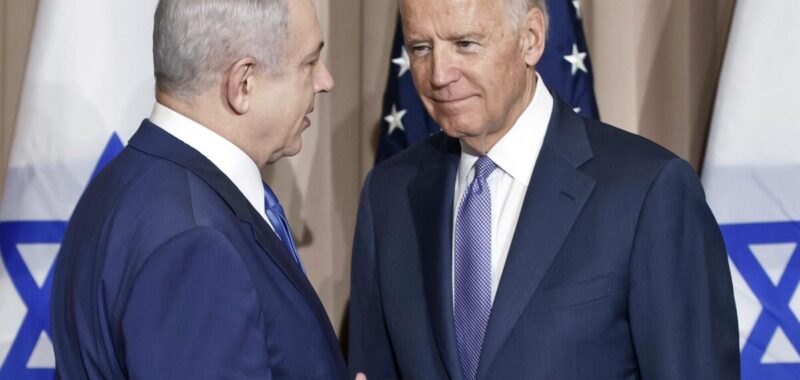Throughout his nearly four years in office, President Biden regularly consulted historians to measure his accomplishments against history, and did so again before stepping out of the presidential race. History will recognize among his many achievements his sweeping economic vision and legislative expertise, which quickly moved the country out of a pandemic recession, reduced wage inequality and created the longest period of full employment in more than 50 years.
Biden also brought about the most significant pro-worker policies in decades. He revitalized agencies that have aggressively moved to clean our air and water of deadly contaminants like toxic “forever” chemicals. And with the narrowest margins in Congress, he secured the votes to enact the first major law to combat climate change in U.S. history, which has created 330,000 good, safe clean-energy jobs so far.
Although Biden seems keenly attuned to his legacy, his foreign policy — like that of Lyndon B. Johnson before him — could forever haunt his record in history books and stain his standing among generations of Americans. Like America’s wars in Indochina, the bloody, nearly yearlong assault on Gaza has unleashed a level of carnage that has horrified the world. It has stoked resistance and division in America. And, like the wars of 50 years ago, it’s contributed to a one-term Democratic president who has, to date, been ineffectual at halting spiraling violence and brutality abroad.
With at least 40,000 Gazans killed by Israel’s offensive so far, seemingly constant reports of fresh bombardments of civilians with U.S. arms have made a mockery of the administration’s claims of concern for human rights. Preventable diseases such as polio as well as famine now threaten the blockaded enclave. Two million people remain trapped and denied adequate food and medical attention.
Israel’s provocative measures abroad — like its assassination of Hamas’ political leader Ismail Haniyeh in Tehran, with whom it was negotiating an end to hostilities and return of Israeli hostages — seem intended to sabotage cease-fire talks and draw the United States into a larger regional conflict. Such a war could be fought for years, with untold further civilian casualties.
It’s no wonder that Republicans seem to delight in Israeli Prime Minister Benjamin Netanyahu’s lawlessness and aggression, as they criticize Biden for supposedly not backing Israel more firmly. They cynically believe that the nonstop devastation of Gaza will discourage some Democratic voters from supporting Vice President Kamala Harris in an election that could once again be determined by a margin of just tens of thousands of votes. Republicans might also hope to benefit politically from a regional war before the presidential election, if it contributed to a jump in oil prices and U.S. involvement in an unpopular conflict.
And Republicans recognize that largely unconditional military support emboldens Netanyahu to exacerbate the suffering in Gaza, continue to strike neighboring countries and yet again reject the U.S. framework for a permanent cease-fire.
But it’s not too late for Biden, in the final months of his term, to act boldly. Freed from some political considerations because he is not running for reelection, he could use the necessary political capital to finally pressure Netanyahu into accepting a permanent cease-fire deal. If Biden acts swiftly and decisively, he could preserve his legacy as a statesman by ending the months of cruelty in Gaza, calming regional tensions and protecting the possibility of a two-state solution.
He would also, incidentally, position Harris to win the November election. A majority of U.S. voters support conditioning military aid on Israel accepting a cease-fire deal, and swing-state voters say they would be more likely to support Harris if a permanent cease-fire were achieved. With an election that could easily be determined by a razor-thin margin, regaining Democratic voters disaffected by Gaza policy could prove decisive to Harris’ victory. By resolving this major and ongoing political liability, Biden would also make room for Harris to credibly defend and expand on his domestic achievements in 2025.
Biden himself suggested Netanyahu is avoiding a permanent cease-fire for his own political self-preservation. That means only U.S. leverage can compel a just outcome for Gaza and the families of Israeli hostages. As Israeli Defense Minister Yoav Gallant admitted in October, “We are not in a place where we can refuse” American demands. “We rely on them for planes and military equipment. What are we supposed to do? Tell them no?”
All Biden has to do is enforce — or simply threaten to enforce — existing U.S. law. As 88 House Democrats noted in May, Section 620I of the Foreign Assistance Act prohibits security assistance or arms sales to any country that restricts U.S. humanitarian assistance. Section 502B of the same law prohibits security aid to any government engaged in a consistent pattern of gross human rights violations. And weapons restrictions in Biden’s own national security memoranda and conventional arms transfer policy provide additional tools of leverage needed to secure a permanent cease-fire. Biden already has the authority to condition or cut off offensive military aid to Israel — if Netanyahu refuses to accept a permanent cease-fire.
Biden can draw on his own experience staring down Netanyahu in 2021. After many phone calls over Israel’s prior assault on Gaza, Biden simply said: “Hey, man, we’re out of runway here. It’s over.” Author Franklin Foer noted: “And then, like that, it was. By the time the call ended, Netanyahu reluctantly agreed to a cease-fire that the Egyptians would broker.”
Biden should draw on history to avoid the pitfalls of the past: Anti-war protests occurred throughout this year’s Democratic National Convention in Chicago, an echo of opposition to the Vietnam War in 1968. A Republican presidential nominee who, like Richard Nixon, disdains the rule of law hopes to take power. By acting now, Biden can end a humanitarian disaster, prevent a return of the authoritarian far right in the U.S. and ensure his righteous legacy in history.
Mark Ruffalo is an actor and advocate for social justice.

